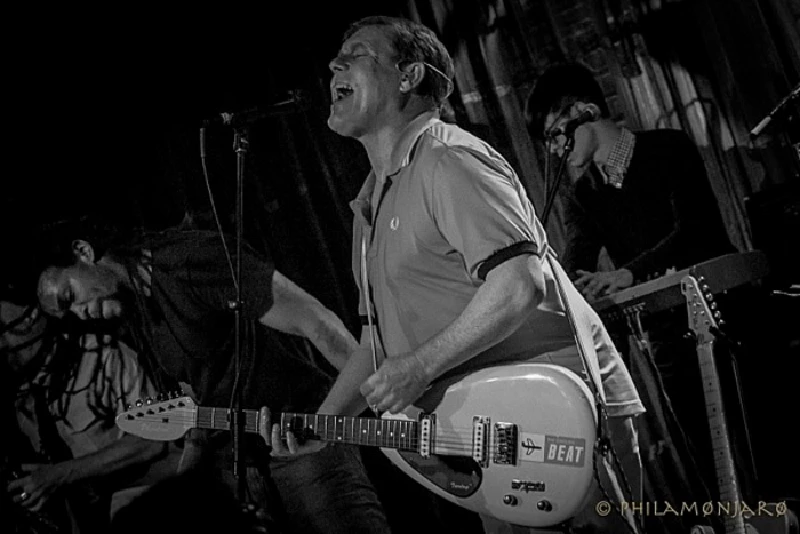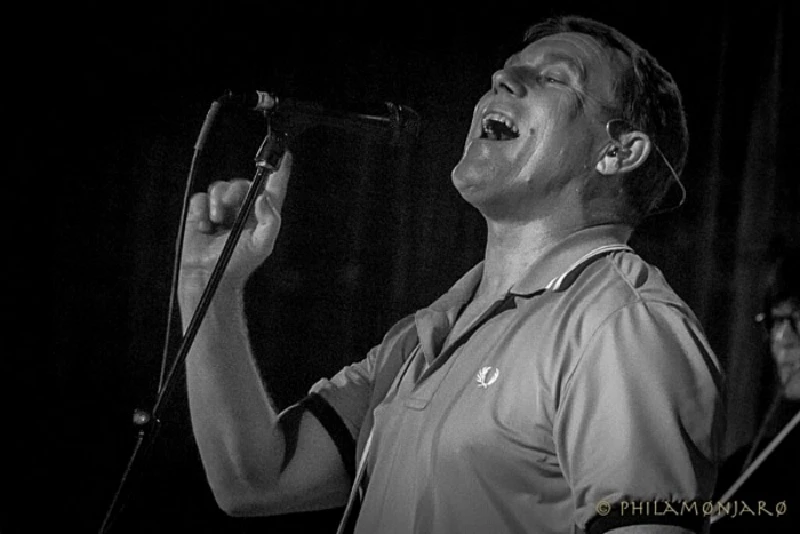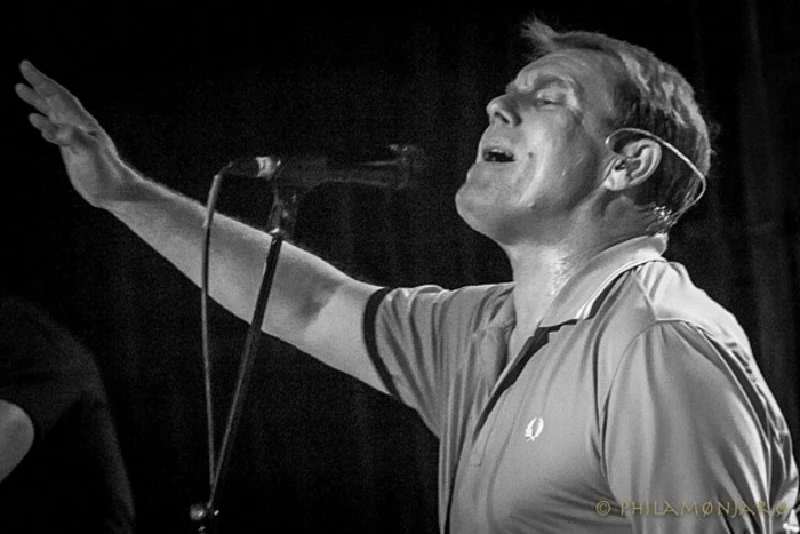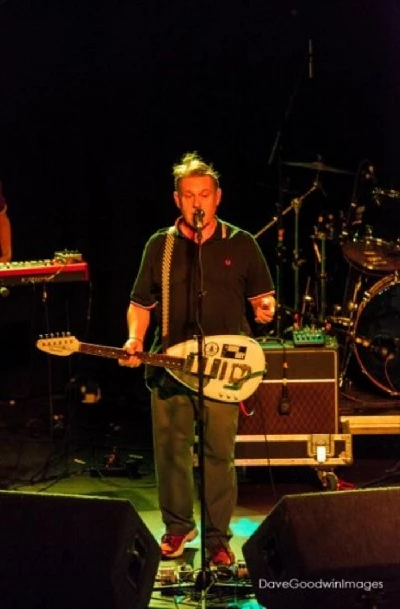English Beat - Interview
by Lisa Torem
published: 25 / 9 / 2015

intro
Whilst touring in support of their fourth studio album, ‘Here We Go Love’, the English Beat’s Dave Wakeling brings Lisa Torem up to speed
Dave Wakeling has fronted the two-tone ska band The English Beat for thirty years. The original sextet was Wakeling, Andy Cox (guitar), David Steele (bass), Everett Morton (drums), Saxa (saxophone) and Ranking Roger (toasting). They broke up in 1983 after recording three albums and reunited in 2003. Andy Cox and David Steele went on to have considerable success with The Fine Young Cannibals, and though the classic material remains the same, another transition took place: Currently Ranking Roger fronts The Beat, whilst Dave Wakeling fronts and promotes The English Beat. These days, the lineup consists of Dave Wakeling, guitar/lead vocals, Matt Morrish, sax/vocals, Kevin Lum, keys/vocals, Larry Young, bass/vocals, King Schascha, “Toaster”, Nucci Cantrell, drums and Brian Klemm, guitar and vocals. Commonly referred to as the “King of Ska”, the Birmingham native/Los Angeles transplant continues casting a wide, cultural net (his signature teardrop Vox guitar shares its celebrity with those of Kurt Cobain and Jimi Hendrix at the Rock and Roll Hall of Fame) and he is well-regarded as a prolific songwriter, whose flair for word play and razor-sharp ear for dance arrangements has trumpeted the band’s success across the pond and in the US since the original lineup shook up Birmingham in 1979. His songs have been covered by Elvis Costello and Pete Townshend. The English Beat boast classics: ‘The Mirror in the Bathroom,’ ’Save It For Later’ and a reggae-inspired cover of ‘Can’t Get Used to Losing You’ and are currently promoting their fourth studio album, ‘Here We Go Love’. Dave also fronted General Public with: “Toaster” Ranking Roger, Stoker (drums), Mickey Billingham (keyboards), Horace Panter (bass) of The Specials and Mick Jones (The Clash), recording three popular albums. ‘Tenderness’ underscores his sonorant timbre and continues to attract commercial interest. Maintaining a strong social conscience, Dave has drawn support for Smile Train, which provides cleft palette reconstruction for children. “For the price of a record industry sushi lunch,” Dave asserts, you can change one’s life. He backs Sweet Relief, which assists musicians in financial need and Greenpeace, where he produced a multi-artist solar energy project. But that music! How does Dave create songs that make fans so deliriously happy that they bobble head with strangers and bar maids, echoing ‘Whine and Grind’ as if they, themselves, scrawled those catchy words on a cocktail napkin? The eve before our interview, I stood in awe of their infectious vitality. The English Beat never showed an ounce of fatigue, performing nonstop amidst a feverish sea of brass. SchaScha bantered, Dave cantered, the whole lot kicked out interactive solos. But how does a Brit-Angelino maintain the mercurial title of King of Ska? Isn’t ska from Jamaica? I had to crack the code so I sat across from Wakeling as he searched frantically for coffee filters in the band’s autumn-coloured bus. They would be performing another sold-out night at Space. Life was busy for The Beat on their (ahem) rare day off. Guitarist Brian Klemm peeked through the window to wave “hi” before an invigorating jog, the spirited sound tech, Brad, bravely nursed a broken toe over an ice-cold soda. Their sound check would be happening shortly, but Dave, wearing a deep blue polo shirt (his mum, who raised him on Gaellic lullabies, advised him to sport apparel that matched his eyes), talked animatedly about the Birmingham post punk culture, influences, writing and ‘Here We Go Love’ without addressing his grueling schedule once. I guess English Beat time, like island time, is more about connecting than chasing the clock. So here’s Dave. PB: What did you play from ‘Here We Go Love’ last night? DW: We played ‘The Love You Give Lasts Forever', Tonight we may play, ‘Every Time You Told Me’. We practiced it this afternoon and we’ll see. It’s interesting and odd with new songs. Everybody’s dying to hear new songs, but they don’t really want to hear that many in a row—you don’t really want to put more in: you don’t want to lose peoples’ attention. They hear the band, it’s special and it brings all of their memories back. You’re allowed to do about two or three and then by the time the record is out, you should have about six or seven available to see which ones they want. PB: In general, how do you move from the bones of a song to a complete arrangement? DW: I write usually from the poem down. Words come, the situation happens, they develop a cadence that suggests a tune and I try and fit my guitar around it. The poem becomes a song I start singing to myself and I can’t get it out of my head: angelic bass lines, cellos. The orchestra in your head visits, suggesting all these bits. By the time I get to show it to people I’ve usually got some idea of what I’d like them to play and then you’ve got a fine line. You can get them to play exactly what you hear and you can’t get them to play that with total commitment because it’s not what they hear or you can get them to play most of what you hear and give them a bit of space to fill and that way, normally, you get more bits done with conviction. They play to the strengths that they have. I don’t give them the part if that’s not what they’re great at. PB: Are the touring musicians also the ones that recorded on the new album? DW: Some of them are old friends and then, Brian, the new guitarist, is going to be practicing the new album with me right where you’re sitting on the bus at two o’clock everyday. I don’t know how we’re going to do this everyday, but we will. We’re going to go through a couple of the new songs each day, write some notes so he can start to get the feel of them and I’m going to play them with him in the studio so we can get a live guitar jam going. I’ve got a guitar part down for all of them but it was done right at the beginning. And sometimes it’s nice once you’ve got the rest of it done, you can give it a bash yourself and run it through as a performance rather then a blueprint. So we are going to jam with guitars when we get back in August and then there is the brass section to do, which is harder than it looks. PB: They make it look easy, but I’m sure it’s more complicated. DW: You can’t just have a tune in your head. You have to write it all out and know what intervals the trumpet and saxophone and trombone use and what keys they play it in. I don’t do that but ask me about the second verse in ‘Tenderness’ and I’ll hum the idea I’ve got. I can do that, but what that is in trumpet speak, who knows, so we have to get somebody in for that. We had a bit of a go at it, but we also needed to find a brass section that was used to each other and could react to each other, know each other’s styles and put their placement of harmonies where they think they’d be most effective. It’s quite tricky and there are different styles on the record. For example, ‘If Killing Worked, It Would Have Worked By Now’ has a rocky, stadium New-Jerseyish sort of thing. I envision the Clash and Tom Petty doing a benefit concert and Bruce Springsteen shows up for a song. It’s that kind of vibe so the brass that I hear in the orchestra in my head is that of Southside Johnny and the Asbury Dukes, all brass, white, East Coast Soul. ‘They Call It Ska’ is a more reggae-orchestra arrangement. Three or four are a bit more reggae-ish and then there is the big, brash soul sound. A couple more are more winsome. It’s tricky, going from humming it in my head and getting that into three brass instruments and onto the tape. It was a little harder that I thought. PB: Do you and King Scha Scha rehearse a lot to create that unique onstage chemistry? DW: No, we purposely don’t rehearse - so that it evolves. It’s always about Scha Scha anyway because there is always an interesting dynamic between two singers upfront. Sometimes you want to be singing in unison, or sometimes I want to be singing alone so he needs to be doing something else. It’s interesting to watch. When he was trying too hard to start with, he’d be standing about two feet in front of me, clapping, and I’d say, ‘Get out of the way. You can work hard, but don’t take my limelight (laughs).’ He’d be getting the whole of the crowd clapping but half the crowd can’t see me because ‘they can only see you clapping while I’m singing my ass off. Step back, buddy.’” But we’ve found good balance with that. But what I’m interested in even more is Brian, the new guitarist. It’s only his third show. PB: Brian was very excited to be playing with you. DW: He said, ‘If it gets too much, can you just tell me to relax?’ which I did three times last night. ‘Oh, yeah. So that’s nice, isn’t it?’ You don’t want to extinguish excitement. It’s a rare commodity. But I like it because they’re both tall and athletic. I’ve been thinking of moving the saxophone player over to my side so Scha Scha and the guitarist can go off because they can create wonders together, like a basketball team onstage. PB: Take us back to Birmingham in the late 1970s. DW: (Dave puts forefingers on his temples, assuming a glassy stare). I’m getting something. I’m seeing a man. He’s got dark hair and his name is Bob (laughs). I can’t hardly bloody remember. There was an excitement in the air because punk had broken all the rules, not just by being naughty but the rules had remained broken for a minute so nobody quite knew how to rebuild the edifice, so record companies, it was as if they were scrambling around in the ruins in these buildings in London, wondering what had just happened. Some had completely missed signing the punk bands that had sold loads of records and others had signed them and wished they’d missed it. They were just not set up. The record companies had been very grand and all of a sudden kids with their attitudes and guitars were making fools of them. But in that interim, if you’d got a crowd and were dancing, the record companies were all over you. God damn it, let’s not miss another one. So musically it was really diverse. You could like The Smiths, The Cure, Echo and the Bunnymen, and The Beat. There wasn’t anything wrong with that. There isn’t still, but in that post punk period it wasn’t quite as tribal. PB: Tribal? DW: It wasn’t like, if you liked Echo and The Bunnymen, you had to like a certain other set of groups and not others. Things get split up into genres quite a lot now, don’t they--pop, punk, post punk. There was something about the anarchy that had come about in the music industry after punk that people were allowed to like quite a lot of stuff. We played with Echo and The Bunnymen, The Psychedelic Furs and The Human League and everybody thought it was weird, but it wasn’t. A little bit later on into the MTV era, it would have been weird, ‘Oh, those are different genres?’ And then, more or less, it was ‘80s retro. There was no, who’s ever left standing is on the bill. PB: Wasn’t there a great deal of cultural acceptance in Birmingham? DW: It was enforced. It was industrial integration. Everybody got forced into the same factories. The men on the factory lines had less inherent racism in them because they had to work next to a black guy or an Indian guy. Over the years they probably found they had more in common than their differences. The issue was, when we started doing shows in the south, where they could afford to be separate, and it’s still kind of chosen to be, in a way. It was really the last gift of the industrial revolution, which is interesting because a lot of it had started in Birmingham with the steam engine and that sort of thing. In our case, all that really was, was a reflection of the pub culture. It was more spread out in demographics than the pubs. There were white pubs, black pubs and probably Indian pubs, but you could more or less go to any pubs so long as you watched your manners and that led to an interesting mixing of the cultures. And watching the steps--The first black people arrived from Jamaica in the late 1950s, early 1960s. PB: How did you develop musically with General Public? DW: I don’t even know if it’s an evolution, I just see it as gentle patterns in my songwriting. It changes. There was no great plan about how General Public was going to be different from The Beat. It was, what are the first ten good songs we’ve got? PB: ‘Stand Down Margaret’ had political overtones. Did it cost the band anything? DW: Yeah, it did, but it was worth it. The BBC had learned its lessons from ‘God Save The Queen’ by the Sex Pistols, which they banned, so we all had great fun buying a copy every two weeks so it could stay number one on the charts for eight weeks all the way to the big celebrations of the group. So they learned their lesson. They didn’t ban it, they just stifled it with a pillow so it stopped getting played and it dropped down the charts. They made sure it died on the vine once they realised what it was about. It didn’t take too long, about a couple of weeks and then, ‘Oh, that’s strange, it seemed to be selling really well, but it just dropped in the charts.’ We’d done these songs and suddenly we’d been hurled into pop stardom. Me and Andy, at least, were social activists and David was quite punk and proud of those things, too, and it was a bit embarrassing having so much media space. ‘So what’s your favourite breakfast, what’s your favourite girl’s hair colour?’ I would say, ‘My favourite breakfast? A blonde and a brunette.’ But it seemed to be daft. So we had this idea. Why can’t we be like the Monkees but with John Lennon in the group so that you get yourself into situations and be all poppy and then try and drop the bomb (laughs)? So what happened with ‘Stand Down Margaret’ was a reaction to that. We’d been on lots of marches and demonstrations and then we were in a pop group and under pressure to do that and they said, ‘don’t say anything that’s controversial. It might affect your sales.’ Fuck that. We could have modelled this a bit more, but we didn’t. It was for the general good, really, apart from Margaret Thatcher becoming the longest reigning tyrant since Oliver Cromwell. It was no reaction to our song; she’d just become dogged. It took her ages to go. This house of cards will fall, mark my words. Eighteen years later, they’re still waiting for that trickle down to trickle. It still hasn’t trickled and I notice it hasn’t here, either. So they’re either wrong or moral, or maybe they’re both. They do trickle up. You don’t see that in physics very often, gravity going up. PB: In a movie of your life, where would you start? DW: The swimming pool, I think, training as a young teen or preteen. That’s what this was all for, learning how to hold my breath for a length. They should give medals for singing. I was thinking about that. There was a book about Mavis Staples, a far more interesting character than me. I don’t even think books about musicians are interesting. The songs are interesting. In the same way, why do I want to read about how Giorgio Armani came up with his colour pattern for ties in the ‘50s? PB: But can you separate the work from the artist? DW: The more I find out, the less you know who you are. Most everything I’ve said has been wrong. When you write an autobiography, your recollection of it is very personal. I think they do it on purpose to sell books, where they get the members of the group to argue over what happened, when, in fact, they’re all right. PB: You have mentioned your father in previous interviews. How did he feel about your covering his generation’s ‘Can’t Get Used to Losing You’? DW: He suggested it. At the same time, he and David Steele were walking, unbeknownst to each other, in the same direction, which was odd. My dad had come home from his gentleman’s club, happy, and he talked about The Beatles. ‘You know where you’ve gone wrong, don’t you Dave? I said, ‘Sorry?’ ‘Yeah, the Beatles. They were the first ones who thought they could do the bloody lot, weren’t they? They said, ‘we’re going to write and produce and play all the bloody instruments.’ He said, ‘you didn’t see Frank Sinatra standing up there writing bloody songs, did you, Dave? No, he was out doing models. He had proper songwriters writing songs for him—no offence, but real songwriters: Tin Pan Alley, proper songwriters. Now you know what you can sing the piss out of, don’t you? ‘Can’t Get Used to Losing You’.” David Steele suggested the same song and came up with a bass line that sounded like reggae (Dave belted out the bass line). We never played it live, just played in the studio and I’d sung it to myself when it was on the radio. I started singing and I realised I had no idea how to sing it, really, apart from doing it as an Andy Williams impersonation as I had done as a kid. I started doing it and they said, ‘That’s it. You’re really getting it now.’ So we did a few takes of Andy Williams’s impersonations until there was a bit of me in there. It was ‘Andy Williams doing Dave Wakeling’ and that was the finished vocal. We added some strings and it was released when the band split up in 1983-84 as a farewell single. It went to number three in the English charts and we made the album. We’d been lucky with that and ‘I’ll Take You There’ and “Tears of a Clown’ because the arrangement was catchy. It wasn’t just a slavish cover of a song. It had something that made it stand up on its own feet. People have said that the cover of ‘Tears of a Clown’ was their favourite cover. It was different enough but respectful towards the original. You have to be careful when you pick a song because it might work better in your head than it does when you work it out. We wanted to do ‘Here Comes My Baby’ but if we did it as slowly as the Cat Stevens version, it sounded dull as reggae but if we did it as fast as the ‘60s pop version, it sounded a bit forced. I thought there was a tempo that would get the best of both versions, but there wasn’t. PB: How do you see the future? DW: It’s hard to tell which way the world is headed, towards enlightenment or another dark ages. The hippie revolution and the punk revolution seemed to do nothing, there was never one world, and it was adopted by a series of hedge funds. We didn’t get much past that and we’ve gotten to international communication on the Internet, but it’s really just to sell us more stuff. It hasn’t turned out to be what we marched for. We have to take into account human nature and you wonder—we write all of these political opinions from our best positions. ‘We’re all going to do this’ but as soon as the ink’s dry, at least a third of the population is looking for the loopholes because that’s kind of human nature, too, but it’s never really taken into account - the systems. It’s ‘That communist or capitalist', and in the western world, we’re so polarised and divided that it feels like we may not accomplish anything. In America, there’s more tolerance between more sets of people than in the history of the world anywhere although the news is lurid about anytime it goes wrong. The vast majority of Americans get along damn well with everybody with people quite different from them. They become used to it and quite open-minded so the silent majority is a vocal minority and it’s a shame that that sort of extremism inspires extremism from all sorts of other sides as well. It’s almost as if they create each other. PB: So what do we need to survive? DW: Compassion. That’s the only thing that’s strong enough to deal with what’s going on now. If pushed into a corner, we’re all capable of enormities and we have to try to take that into account with our systems because we’re always going to appeal to each other’s extremes. That’s what the song, ‘If Killing Worked, It Would Have Worked By Now’ is about. Watching the decline of our civilization on television, we don’t grasp the obvious truths beyond these enormous problems because it’s too scary, or I don’t know what it is. PB: Thank you. Photos by Philamonjaro http://www.philamonjaro.com
Band Links:-
https://www.facebook.com/EnglishBeatFanshttp://englishbeat.net/
Picture Gallery:-


live reviews |
|
Rescue Rooms, Nottingham, 5/10/2016 |

|
| Dave Wakelings 80's ska outfit The English Beat return to Nottingham in good style, lighting up the Rescue Rooms with their own brand of two-tone excellence |
| ABC2, Glasgow, 10/3/2014 |
most viewed articles
current edition
Peter Doherty - Blackheath Halls, Blackheath and Palace Halls, Watford, 18/3/2025 and 21/3/2025Armory Show - Interview with Richard Jobson
Liz Mitchell - Interview
Deb Googe and Cara Tivey - Interview
Lauren Mayberry - Photoscapes
Max Bianco and the BlueHearts - Troubadour, London, 29/3/2025
Garfunkel and Garfunkel Jr. - Interview
Maarten Schiethart - Vinyl Stories
Clive Langer - Interview
Sukie Smith - Interview
previous editions
Heavenly - P.U.N.K. Girl EPBoomtown Rats - Ten Songs That Made Me Love....
Trudie Myerscough-Harris - Interview
Doris Brendel - Interview
Beautiful South - Ten Songs That Made Me Love...
Dwina Gibb - Interview
Kay Russell - Interview with Kay Russell
Pulp - Ten Songs That Made Me Love...
Barrie Barlow - Interview
Sound - Interview with Bi Marshall Part 1
most viewed reviews
current edition
Davey Woodward - Mumbo in the JumboNigel Stonier - Wolf Notes
Wings - Venus and Mars
Kate Daisy Grant and Nick Pynn - Songs For The Trees
Only Child - Holy Ghosts
Neil Campbell - The Turnaround
Philip Jeays - Victoria
Darkness - Dreams On Toast
Suzanne Vega - Flying With Angels
Charles Ellsworth - Cosmic Cannon Fodder
Pennyblackmusic Regular Contributors
Adrian Janes
Amanda J. Window
Andrew Twambley
Anthony Dhanendran
Benjamin Howarth
Cila Warncke
Daniel Cressey
Darren Aston
Dastardly
Dave Goodwin
Denzil Watson
Dominic B. Simpson
Eoghan Lyng
Fiona Hutchings
Harry Sherriff
Helen Tipping
Jamie Rowland
John Clarkson
Julie Cruickshank
Kimberly Bright
Lisa Torem
Maarten Schiethart